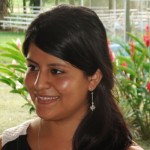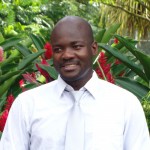Graduating students reflect on their time at EARTH
By Vanessa I Garnica.
 “My family feels that I have received a first rate education here. They also see the fact that I have studied abroad as an opportunity to learn and see other things that the world offers.”
“My family feels that I have received a first rate education here. They also see the fact that I have studied abroad as an opportunity to learn and see other things that the world offers.”Juan Sebastián Gambin (Colombia)
Interview
1. What will you miss most about EARTH?
JSG:: It will be the people, and being able to spend time with them. I will miss being able to exchange experiences with people from different countries and my relationships with my professors as well. Here at EARTH, the professors turn into friends. There are tighter bonds here than there are at other universities.
2. Why did you decide to come to EARTH and did it fulfill your expectations?
JSG: I decided to come to EARTH because I liked its focus and that it included animal production, crop production, environmental protection, and the entrepreneurial part. I think EARTH is a university different from the rest. I think the values and principles that we have learned here will be what enables us to become better professionals and what is going to help us act in the right way.
3. What do you think is the value of EARTH’s experimental approach?
JSG: This approach is the most valuable thing the University has. The practical experience that we receive here almost no other institution has and I think it is what makes people grow.
 “For me, EARTH is very important because it is a holistic university different from any other institution. EARTH covers the technical part, from the research element to the personal factor, where we find out who we are and who we could be.”
“For me, EARTH is very important because it is a holistic university different from any other institution. EARTH covers the technical part, from the research element to the personal factor, where we find out who we are and who we could be.”
Yngrid Espinoza (Peru)
Interview1. Why did you decide to come to EARTH and did it fulfill your expectations?
YE: I decided to come to EARTH because it was going to be a new experience as I would be leaving my country, making my own decisions and sharing with people from other cultures. I think it was my wish of wanting to experience something different, something new. My four years here fulfilled my expectations much more than I expected. I learned how to mature, and how to do things on my own.
2. What is the best advice you received from a professor from EARTH?
YE: I was very homesick the first year and it was difficult for me to adapt to living in a completely different environment. I think the best advice I received was to learn to have confidence in myself and in my dreams. To always dream big and pursue goals. To believe in my capacity.
3. What do you think is the value of EARTH’s experimental approach?
YE: It is one of the best learning methods. The fact that you do things on your own and make mistakes helps you learn more than just reading. At the moment of doing things you can think of many ideas and questions which you can resolve at the moment of an activity.
4. Tell us briefly about your Graduation Project. What did you learn ?
YE: My graduation Project was a self sufficiency program at a high school. When we started we thought we were just going to establish an integrated farm and give some workshops, but in working with people we learned to relate to others, how to treat them, particularly children, and even the teachers, and how to handle conflicts that can arise.
 “We live in a period of economic growth; however, there is more poverty as well. What EARTH wants is to develop a more just and equal society so that everyone can have rights and a better life.”
“We live in a period of economic growth; however, there is more poverty as well. What EARTH wants is to develop a more just and equal society so that everyone can have rights and a better life.”Reginald Cean (Haiti)
Interview
1. Why do you think that an Institution such as EARTH is so important?
RC: The importance of an institution such as EARTH stems from the current problem that the world is facing. We live in a period of economic growth; however, there is more poverty as well. What EARTH wants is to develop a more just and equal society so that everyone can have rights and a better life. That is why an institution such as EARTH is indispensable in order to promote this type of justice in the world.
2. Why did you decide to come to EARTH and did it fulfill your expectations?
RC: Instead of saying why I chose EARTH I rather say that EARTH crossed my path because I was not aware of the institution. A friend told me about the University and I searched information about it. I had normal expectations. I expected to study and leave, but EARTH is different. EARTH transforms people.
3. What is the best advice you received from a professor from EARTH?
RC: In my third year, Professor Julio Tejeda, every time we had class he would tell us how much money our education was costing and about the great number of people that are not here because we are here. That is why we had to take advantage of what education offers us as well as the time.
4. Tell us a little bit about your Graduation Project?
RC: The title of my project is: “Agriculture: a key factor to community development in Haiti.” The purpose of this project is to create a development plan for a particular community in Haiti that could be duplicated in other communities.
 “My father has always been impressed because we learn by doing. This is an approach that other universities do not do. When I would mention to my parents that I built a business, that I was a chief officer of a middle sized company, they are definitely impressed.”
“My father has always been impressed because we learn by doing. This is an approach that other universities do not do. When I would mention to my parents that I built a business, that I was a chief officer of a middle sized company, they are definitely impressed.” Andrea Cedeño (Ecuador)
Interview1. Why do you think that an Institution such as EARTH is so important?
AC: One of the main goals of the University is to form the leaders of tomorrow. And the University has always tried to instill that in each one of us.
2. Why did you decide to come to EARTH and did it fulfill your expectations?
AC: Before I knew about EARTH, I always had the wish of studying agriculture. What I liked most about this Institution was the values it upholds and also how the students live with classmates from other countries. EARTH met my expectations, and more than that, it left me a lot of great things.
3. What does your family think about the education you received at EARTH?
AC: My father has always been impressed because we learn by doing. This is an approach that other universities do not do. When I would mention to my parents that I built a business, that I was a chief officer of a mid-sized company, they were definitely impressed.
4. What do you think is the value of EARTH’s experimental approach?
AC: People who learn about this approach wish they could experience it themselves, as you don’t just learn in the classroom. You can memorize and have a clear idea of the theory, but if you are not confronted by the reality where a number of issues can arise, then you cannot say that you are really learning.




